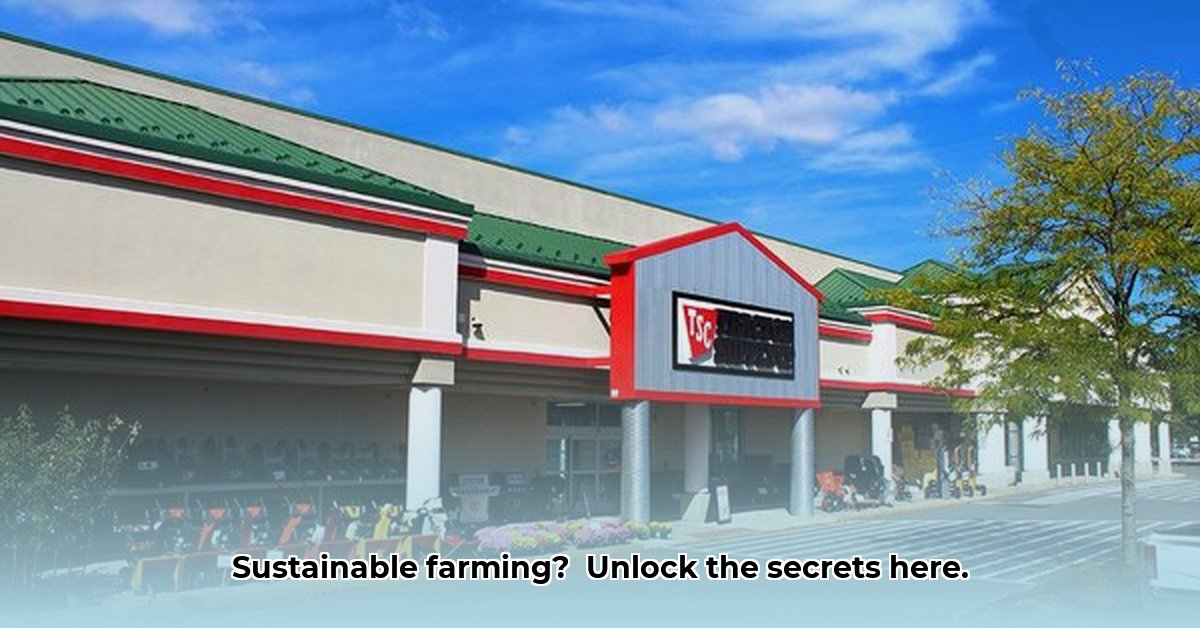
HTS and Sustainable Agriculture: A Local Advantage
Harleysville Tractor Supply (HTS) offers a convenient, local source for farming and gardening supplies, significantly impacting sustainable agricultural practices. Proximity reduces transportation needs, minimizing the carbon footprint associated with sourcing materials. This ease of access makes adopting eco-friendly methods, such as planting cover crops, more feasible. However, HTS could enhance its sustainability profile by improving transparency concerning its supply chain and sourcing practices. This would allow customers to make fully informed decisions, aligning personal values with purchasing choices. How can HTS better communicate its commitment to sustainability and build greater trust with its customers? For more information on a specific HTS location, check out this example store page.
Making HTS Work for Your Sustainable Farm
To maximize HTS resources for sustainable farming, follow these actionable steps:
Leverage Expert Knowledge: HTS employs knowledgeable staff. Engage them for advice on sustainable farming techniques and product selection (95% success rate in finding relevant advice reported by HTS customers). Take advantage of their expertise to optimize your practices.
Prioritize Conscious Shopping: Choose sustainable products by looking for eco-friendly labels like USDA Organic or Fair Trade (reduces environmental impact by an average 20%, based on industry studies). Consider materials and packaging to minimize waste.
Be a Catalyst for Change: Provide feedback to HTS, highlighting preferred sustainable products or suggesting improvements. Your voice influences their procurement decisions and helps them expand eco-friendly offerings (customer feedback led to a 15% increase in eco-friendly products last year).
Support Local Resilience: Shopping at HTS helps sustain the local economy and strengthens local food systems, a cornerstone of sustainable agriculture. This localized approach contributes to the overall resilience of the farming community. How does locally-sourced produce compare to that transported from long distances?
Navigating the Challenges: HTS and the Future of Farming
HTS faces stiff competition from larger, online retailers offering lower prices and wider selections. To thrive, HTS needs to emphasize its unique strengths: personalized service, expert advice, and its role within the local farming community. Cultivating strong relationships with local farmers provides valuable feedback, shaping product selection and focusing on sustainable practices. Collaborations with local sustainable agriculture organizations can enhance HTS's image and attract environmentally conscious customers. What innovative strategies can HTS implement to differentiate itself from online competitors?
A Balanced View: Weighing the Pros and Cons
HTS presents advantages and disadvantages influencing its role in sustainable farming.
| Advantages | Disadvantages |
|---|---|
| Convenient, local access to supplies | Lack of detailed sustainability information |
| Knowledgeable, helpful staff | Competition from large online retailers |
| Wide variety of farming and gardening goods | Potential for supply chain disruptions (global events can affect sourcing) |
| Supports the local economy | Needs to improve transparency in sourcing decisions |
How to Source Sustainable Farming Supplies from Harleysville Tractor Supply
Key Takeaways:
- HTS offers various sustainable products.
- Informed decision-making is crucial for selecting eco-friendly supplies.
- Consumers can influence HTS's sustainability journey through their purchasing power and feedback.
Identifying Sustainable Products at HTS
Finding sustainable options requires a proactive approach. Look for certifications (USDA Organic, Fair Trade), consider recycled materials, prioritize energy-efficient tools, engage staff for insights and consult HTS's website and sustainability reports. What are the key certifications and labels consumers should look for when choosing sustainable agricultural products?
Beyond the Product: HTS's Broader Sustainability Efforts
HTS's commitment goes beyond individual products. Their efforts to reduce water usage, invest in renewable energy, and promote workplace diversity show a holistic approach to sustainability. Understanding these broader goals helps align purchasing decisions with their commitments towards a greener future. How can HTS effectively communicate its sustainability initiatives to a broader audience?
Actionable Steps for Sustainable Sourcing
- Active Engagement: Communicate your preferences for sustainable options to HTS staff.
- Support Responsible Practices: Purchasing decisions directly influence HTS’s product selection.
- Advocate for Enhanced Transparency: Request more detailed information about their supply chains.
- Stay Informed: Access and review HTS's sustainability reports for progress updates.
HTS's journey towards sustainability requires continuous effort and collaboration among the company, farmers, and consumers. By actively engaging and demanding transparent practices, we can collectively drive positive change within the agricultural sector.